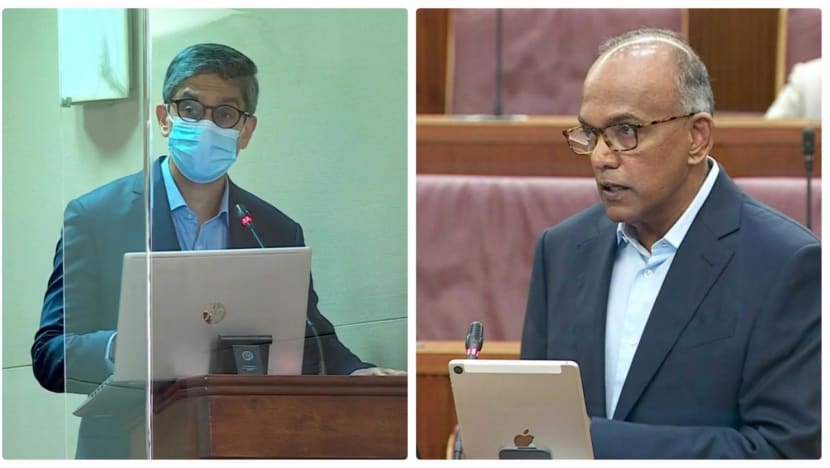'Makes no sense': Shanmugam rebuts WP MP's suggestion for independent ombudsman

Workers' Party Member of Parliament Leon Perera and Home Affairs and Law Minister K Shanmugam.
SINGAPORE: In his speech debating the Home Affairs Ministry’s budget, Workers’ Party Member of Parliament (MP) Leon Perera on Thursday (Mar 3) asked how senior Government ministers are checked for foreign interference, and suggested the creation of an ombudsman to provide independent oversight.
His two-minute speech also called for greater “oversight mechanisms” over the use of extra-judicial caning as a punishment for certain offences.
The Aljunied Group Representation Constituency MP’s suggestion received a lengthy rebuttal from Home Affairs and Law Minister K Shanmugam.
During the exchange, Mr Shanmugam also recalled a remark by Mr Perera last year during the parliamentary debate on the Foreign Interference (Countermeasures) Act (FICA).
"Mr Perera said during the FICA debate: Quis custodiet ipsos custodes. If I recall correctly, for some reason, I think that phrase seems to have lost favour now. Who guards the guards?" said Mr Shanmugam.
Mr Shanmugam appeared to allude to the findings of the Committee of Privileges on the conduct of former WP MP Raeesah Khan when he added: "Now take a hypothetical situation say you have an organisation where the top leaders engage in wrongdoing. Or for example, say they set up a disciplinary committee to cover up what they did rather than actually investigate, I think you can ask Quis custodiet ipsos custodes?
"And if Mr Perera I suppose if he was part of any such organisation, we'll be the first one to make such a point."
Here is an excerpt of their exchange:
MR PERERA: In some of our laws the Government has sweeping powers over many activities. In the MHA Minister’s FICA round-up speech, he said if the CPIB (Corrupt Practices Investigation Bureau) hypothetically “wants to investigate the PM, there is a higher authority they report to".
I would like to return to one question I raised during the debate, which is who checks the checkers, and specifically in relation to foreign interference. The world is changing and geopolitical tensions are ratcheting up to levels that have not been seen in recent memory. Ministers, including the Home Affairs Minister and Prime Minister himself, would be extremely high-value targets for foreign interference, particularly given what some might say is Singapore’s significant role in ASEAN.
What is the nature of the institutional check on senior ministers in respect of foreign interference? Does it reside with the CPIB, which is what the Home Affairs Minister’s reply to my clarification during the FICA debate suggested? If so, does the CPIB proactively assess risks of foreign interference against ministers or does it act only reactively, if complaints are lodged? Are there officers in the CPIB with the necessary skills and expertise to investigate possible foreign interference?
I would like to reiterate calls for an ombudsman to provide independent oversight, similar to those in countries like New Zealand. An office of an ombudsman would create investigative resources behind a legitimate institutional check that would be seen to be legitimate. In the current climate, there is more of a need for this.
MR SHANMUGAM: Mr Leon Perera, I think, reprised a part of the FICA debate. At that time I pointed out to him that in Singapore, we take investigations very seriously. And I explained how the system works and the Prime Minister can be the subject of independent investigations. He didn't respond then. But he's coming back to it today.
Now, what is our structure? If there is wrongdoing by anyone, whether by a minister or civil servant or private sector person, there will be investigations and very few people doubt that ... This Government has added checks on itself, which are very rare elsewhere. We institutionalise it such that the CPIB can go straight to the Prime Minister, but where the Prime Minister himself is the possible subject of investigations, or if the Prime Minister doesn't want to do something, the CPIB can go to the President.
Mr Perera’s suggestion, if I understood him correctly, is that why not we set up a separate ombudsman with the resources to carry out all these investigations? He had a question about whether the CPIB was adequately resourced, trained ... So my inference from that way of phrasing the question is therefore the agency, whichever agency it is, must replicate many parts of our law enforcement agencies, including our intelligence agencies, so that they can do this on a standalone basis.
However, if that is a suggestion ... I would suggest it doesn't make much sense. Because, how do you replicate, (and) at what cost, an entire investigative mechanism outside the government?
Mr Perera referred to New Zealand, and I've often found that whenever we make these references, they sound sexy, but then when you actually look at what's happening, I find that the debates get very academic, without any grounding in reality, without perhaps either understanding or acknowledging what really happens in Singapore. What is our situation? How well have we managed to handle and keep corruption and official wrongdoing low? And how are other countries in this context?
I would ask members to perhaps do their research before they cite various countries and their institutions as models.
Let me ask: You set up an ombudsman, with or without the full suite of resources and without any oversight from the Government, who then deals with misconduct by the ombudsman or the officers within that office?
Mr Perera said during the FICA debate: "Quis custodiet ipsos custodes?" if I recall correctly. For some reason, I think that phrase seems to have lost favour now. Who guards the guards? Now, take a hypothetical situation - say an organisation where the top leaders engage in wrongdoing, or for example, say they set up a disciplinary committee to cover up what they did rather than actually investigate, I think you can ask “quis custodiet ipsos custodes”. And if Mr Perera was part of any such organisation, we'll be the first one to make such a point.
But for (this) Government, with the systems in place, and the variety of people who can lodge complaints and investigate, be it the Auditor-General, Attorney-General, CPIB, police ... Civil servants are obliged, if they think the Minister is being wrong, to take it up to higher authority.
And if they believe that the higher authority is not acting properly, they can take it up all the way. These civil servants are protected through the structure of the Public Service Commission, which in turn is protected through the fact that appointment cannot be interfered with willy-nilly by the Government.
He had a second question on caning ... And he suggested there should be, no surprise, an outside commission to decide on institutional caning.
(For) every aspect of government, anyone who is unhappy, go to an ombudsman, you've got to then set up an entire huge structure at the taxpayers expense to investigate this. Rather than having a proper legal process, including a complaint system, an independent investigation set up, say by the police with some outside people sitting on it, or through judicial review.
MR PERERA: I thank Mr Shanmugam for his lengthy comments on my two minutes of cut speech.
My question would be that if instituting an independent organisation with investigative powers against the executive government, such as an ombudsman, is such a bad idea, why are so many countries doing that?
Fundamentally, the main argument for this ombudsman comes down to the fact that currently law enforcement institutions sit on the organisation chart within the executive government. They are within that command and control hierarchy, at the end of the day. An ombudsman would report to Parliament ... And that means that it sits fundamentally in a different place organisationally.
So when it investigates alleged abuses, it seems to be an investigation coming from different parts of the government. Being seen to do that has advantages in terms of accountability that is felt by the society. That has advantages in terms of the strength and solidarity of our polity. I would say that there are tangible advantages to be gained from that.
It is difficult to speak of practical benefits that would come from instituting this proposal because it's a hypothetical, of course, we've never had ...
CHAIRMAN (MR TAN CHUAN-JIN): Mr Perera, please keep it to clarifications or questions if you can.
MR PERERA: Okay, I’ll just wrap up in the next minute ... What I can say is that, in terms of the perception of legitimacy, I think there is a benefit there. The Minister mentioned various practical issues that could come about, for example, do we want to have duplicate resources? There are practical solutions to that. You could design an office of an ombudsman to address that. Investigations could be directed by the office but they could seek resources from other agencies.
MR SHANMUGAM: In a way, I’m not sure that they are far apart, because I had anticipated this point which is why I said there are two possible ways.
One is, you replicate the entire resources, various parts of its own machinery outside, which makes no sense. The alternative is, the ombudsman uses the Government’s machinery. I think Mr Perera overlooks, if he uses the machinery, those sit within the government, they sit within various ministries.
And today, the very same agencies can report directly to the President, and I have explained how that is so. So I don’t understand what the argument is. Maybe Mr Perera hasn’t understood the constitutional structure and how the CPIB can go directly to the President. Thank you, sir.
This story was originally published in TODAY.
















